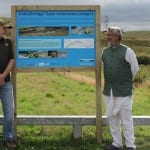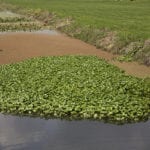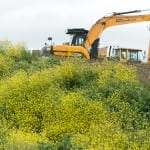Drastic planning reforms could destroy nature’s future, says RSPB
The government is approaching a “fork in the road” that could “change the course of the future for nature” as it plans to shake...
Portable DNA probe promises real-time identification of biological species in the field
Scientists’ glowing endorsements of Oxford Nanopore’s MiniION portable DNA sequencer, as reported in the media in mid-October, suggest a host of potentially revolutionary applications,...
Legal levels of herbicides pose risks for stream macroalgae
Spraying herbicides to kill weeds has become a normal practice among farmers, with many regularly dousing their fields to ensure space and nutrients for...
New solution for capturing microplastics before they enter waterways
A thousand litres of seawater can contain up to 8.3 million particles of microplastics. Udentifying these very small particles has been difficult – usually...
Insights from the zebrafish could help humans reach Mars
Studying the zebrafish could advance efforts to reach Mars, say researchers, by understanding how a form of hibernation, known as induced torpor (a...
“Water man of India” comes to Rabbit Ings Country Park
A world-renowned water conservationist has visited Rabbit Ings Country Park near Barnsley to study an innovative water restoration project in the Dearne Valley.
Rajendra Singh,...
Government sets out new targets on air quality, water pollution, waste and woodland cover
The UK government announced new environmental targets in four key areas of air quality, water, waste reduction and woodland cover on 16 March....
Medical drugs harmful to invertebrates in UK waterways
Wildlife charity Buglife is attempting to raise awareness of the occurrence of medical drugs in UK rivers, and the threat this presents to freshwater...
Structure and ecology prop
The Port of San Diego and eco-engineering company ECOncrete have launched a three-year pilot project on Harbor Island in the Bahamas to demonstrate a new variant of the firm’s interlocking COASTALOCK tide pool armour
Fish pass construction project resumes in Worcestershire
In early July, environmental engineering company Land & Water announced it was set to resume the construction of one of four fish passes along...
Defra appoints ecological consultancy as ‘responsible body’ to work with landowners
The Department for Environment, Food and Rural Affairs (Defra) has appointed a new ‘responsible body’. Ecological consultancy RSK Biocensus – and specifically its biodiversity...
Study reveals the global growth of ecological and environmental citizen science is fuelled by...
Scientists at the UK-based Centre for Ecology & Hydrology (CEH) and the Natural History Museum, London have revealed the diversity of ecological and environmental...
Summer reed cutting is essential, says waterways expert
The Rothen Group, an independent civil engineering and maintenance business servicing UK waterways, has issued a warning to raise awareness of the dangers of overgrown weeds choking the waterways this summer .
Threat to terrestrial ecosystems and food security detailed in IPCC land use report
Land is under growing pressure from human activity and climate change is adding to these pressures, according to a report released by the IPCC...
Nature critical to infrastructure for sustainable development: UN report
Nature-based infrastructure solutions can influence 79% of all targets across the Sustainable Development Goals, highlighting the critical role nature can play in advancing sustainable...
Treat climate change and biodiversity loss as one, says European science advisory group
The recent IPCC Report confirms that global warming is picking up pace. The impact is playing out in real time as we watch villages flood and forests burn.
Veolia and the RSPB celebrate “landfill facelift” and biodiversity work in Essex
Work with the RSPB continues to promote local biodiversity across Pitsea Landfill site in Essex, says Veolia.
Equivalent in size to approximately 450 international football...
Fish mislabelling a threat to marine conservation
Scientists have found widespread mislabelling, poor trading practices and neglect for endangered species are threatening fish stocks after DNA-testing seafood products sold across...
Utility offering funds for charitable organisations to improve their local water environment.
United Utilities has launched a new grant scheme aimed at helping charities to improve their local river catchment for the benefit of the community.
The...
20-year research project reveals “devastating loss of British & Irish flora“
The creators of the new Plant Atlas say it is “the most powerful statement ever produced on the state of our wild and naturalised...























